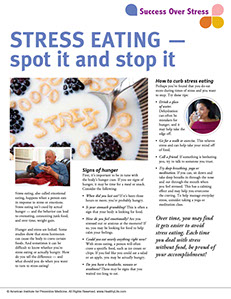SYMPTOM CHECKER
CONDITIONS
Male
Female
Child
Arm, Hand & Shoulder Concerns
Legs & Feet Concerns
Dental & Mouth Concerns
Ear & Nose
Eye Conditions
Head Conditions
Arm, Hand & Shoulder Concerns
Legs & Feet Concerns
Front
Back
Arm, Hand & Shoulder Concerns
Dental & Mouth Concerns
Ear & Nose
Eye Conditions
Head Conditions
Arm, Hand & Shoulder Concerns
Dental & Mouth Concerns
Ear & Nose
Eye Conditions
Head Conditions
Front
Back
Arm, Hand & Shoulder Concerns
Neck Links
Head & Neck Concerns
Arm, Hand & Shoulder Concerns
Neck Links
Head & Neck Concerns
Front
Back
Online Clinic
Wise Healthcare
Stress eating — spot it and stop it
Print on Demand
Stress eating, also called emotional eating, happens when a person eats in response to stress or emotions. Stress eating isn’t cued by actual hunger — and the behavior can lead to overeating, consuming junk food, and over time, weight gain.
Hunger and stress are linked. Some studies show that stress hormones can cause the body to crave certain foods. And sometimes it can be difficult to know whether you’re stress eating or actually hungry. How do you tell the difference — and what should you do when you want to turn to stress eating?
Signs of hunger
First, it’s important to be in tune with the body’s hunger cues. If you see signs of hunger, it may be time for a meal or snack. Consider the following:
• When did you last eat? If it’s been three hours or more, you’re probably hungry.
• Is your stomach grumbling? This is often a sign that your body is looking for food.
• How do you feel emotionally? Are you stressed out or anxious at the moment? If so, you may be looking for food to help calm your feelings.
• Could you eat nearly anything right now? With stress eating, a person will often crave a specific food, such as ice cream or chips. If you feel like you could eat a salad or an apple, you may be actually hungry.
• Do you have a headache, nausea or weakness? These may be signs that you waited too long to eat.
How to curb stress eating
Perhaps you’ve found that you do eat more during times of stress and you want to stop. Try these tips:
• Drink a glass of water. Dehydration can often be mistaken for hunger, and it may help take the edge off.
• Go for a walk or exercise. This relieves stress and can help take your mind off of food.
• Call a friend. If something is bothering you, try to talk to someone you trust.
• Try deep breathing, yoga or meditation. If you can, sit down and take deep breaths in through the nose and out through the mouth when you feel stressed. This has a calming effect and may help you overcome the craving. To help manage everyday stress, consider taking a yoga or meditation class.
Over time, you may find it gets easier to avoid stress eating. Each time you deal with stress without food, be proud of your accomplishment!
This website is not meant to substitute for expert medical advice or treatment. Follow your doctor’s or health care provider’s advice if it differs from what is given in this guide.
The American Institute for Preventive Medicine (AIPM) is not responsible for the availability or content of external sites, nor does AIPM endorse them. Also, it is the responsibility of the user to examine the copyright and licensing restrictions of external pages and to secure all necessary permission.
The content on this website is proprietary. You may not modify, copy, reproduce, republish, upload, post, transmit, or distribute, in any manner, the material on the website without the written permission of AIPM.
2021 © American Institute for Preventive Medicine - All Rights Reserved. Disclaimer | www.HealthyLife.com
















































